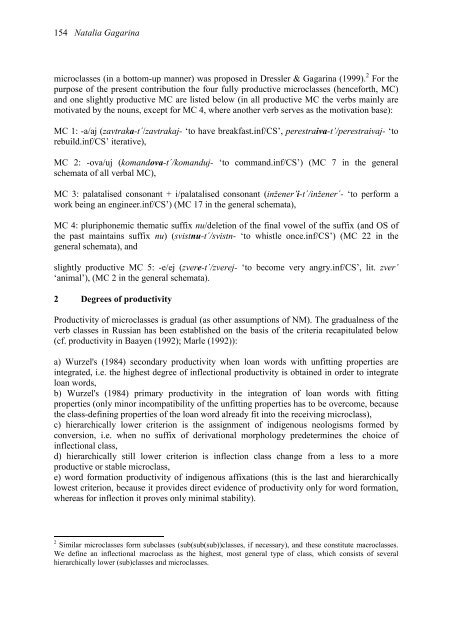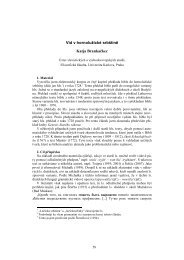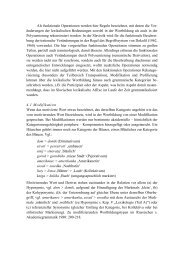Productivity of the verbal inflectional classes
Productivity of the verbal inflectional classes
Productivity of the verbal inflectional classes
Create successful ePaper yourself
Turn your PDF publications into a flip-book with our unique Google optimized e-Paper software.
154 Natalia Gagarinamicro<strong>classes</strong> (in a bottom-up manner) was proposed in Dressler & Gagarina (1999). 2 For <strong>the</strong>purpose <strong>of</strong> <strong>the</strong> present contribution <strong>the</strong> four fully productive micro<strong>classes</strong> (henceforth, MC)and one slightly productive MC are listed below (in all productive MC <strong>the</strong> verbs mainly aremotivated by <strong>the</strong> nouns, except for MC 4, where ano<strong>the</strong>r verb serves as <strong>the</strong> motivation base):MC 1: -a/aj (zavtraka-t´/zavtrakaj- ‘to have breakfast.inf/CS’, perestraiva-t’/perestraivaj- ‘torebuild.inf/CS’ iterative),MC 2: -ova/uj (komandova-t´/komanduj- ‘to command.inf/CS’) (MC 7 in <strong>the</strong> generalschemata <strong>of</strong> all <strong>verbal</strong> MC),MC 3: palatalised consonant + i/palatalised consonant (inžener’i-t´/inžener´- ‘to perform awork being an engineer.inf/CS’) (MC 17 in <strong>the</strong> general schemata),MC 4: pluriphonemic <strong>the</strong>matic suffix nu/deletion <strong>of</strong> <strong>the</strong> final vowel <strong>of</strong> <strong>the</strong> suffix (and OS <strong>of</strong><strong>the</strong> past maintains suffix nu) (svistnu-t´/svistn- ‘to whistle once.inf/CS’) (MC 22 in <strong>the</strong>general schemata), andslightly productive MC 5: -e/ej (zvere-t´/zverej- ‘to become very angry.inf/CS’, lit. zver’‘animal’), (MC 2 in <strong>the</strong> general schemata).2 Degrees <strong>of</strong> productivity<strong>Productivity</strong> <strong>of</strong> micro<strong>classes</strong> is gradual (as o<strong>the</strong>r assumptions <strong>of</strong> NM). The gradualness <strong>of</strong> <strong>the</strong>verb <strong>classes</strong> in Russian has been established on <strong>the</strong> basis <strong>of</strong> <strong>the</strong> criteria recapitulated below(cf. productivity in Baayen (1992); Marle (1992)):a) Wurzel's (1984) secondary productivity when loan words with unfitting properties areintegrated, i.e. <strong>the</strong> highest degree <strong>of</strong> <strong>inflectional</strong> productivity is obtained in order to integrateloan words,b) Wurzel's (1984) primary productivity in <strong>the</strong> integration <strong>of</strong> loan words with fittingproperties (only minor incompatibility <strong>of</strong> <strong>the</strong> unfitting properties has to be overcome, because<strong>the</strong> class-defining properties <strong>of</strong> <strong>the</strong> loan word already fit into <strong>the</strong> receiving microclass),c) hierarchically lower criterion is <strong>the</strong> assignment <strong>of</strong> indigenous neologisms formed byconversion, i.e. when no suffix <strong>of</strong> derivational morphology predetermines <strong>the</strong> choice <strong>of</strong><strong>inflectional</strong> class,d) hierarchically still lower criterion is inflection class change from a less to a moreproductive or stable microclass,e) word formation productivity <strong>of</strong> indigenous affixations (this is <strong>the</strong> last and hierarchicallylowest criterion, because it provides direct evidence <strong>of</strong> productivity only for word formation,whereas for inflection it proves only minimal stability).2 Similar micro<strong>classes</strong> form sub<strong>classes</strong> (sub(sub(sub))<strong>classes</strong>, if necessary), and <strong>the</strong>se constitute macro<strong>classes</strong>.We define an <strong>inflectional</strong> macroclass as <strong>the</strong> highest, most general type <strong>of</strong> class, which consists <strong>of</strong> severalhierarchically lower (sub)<strong>classes</strong> and micro<strong>classes</strong>.




